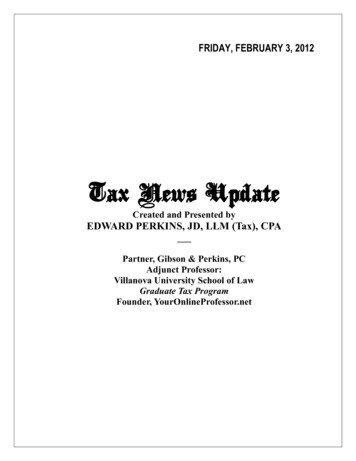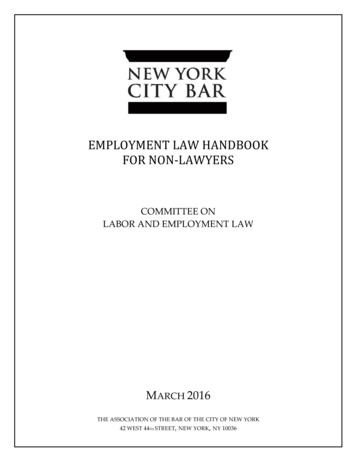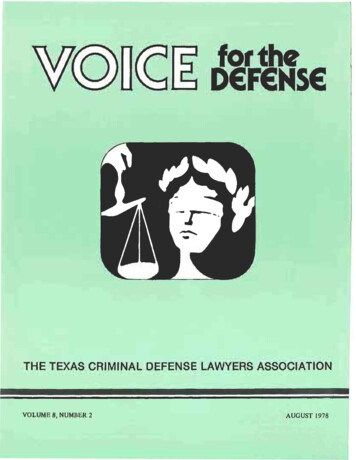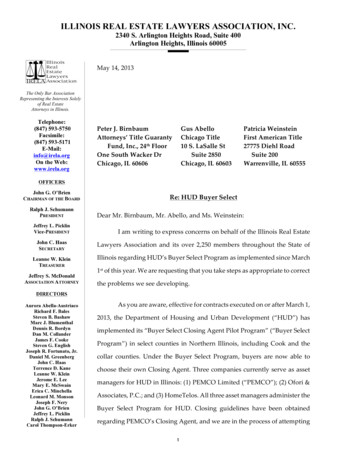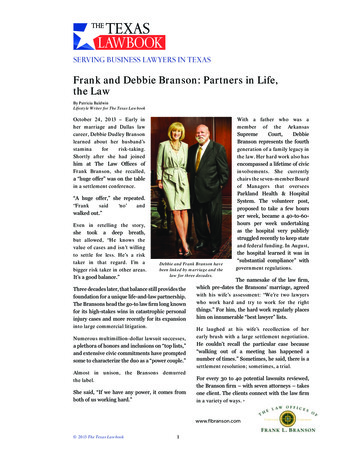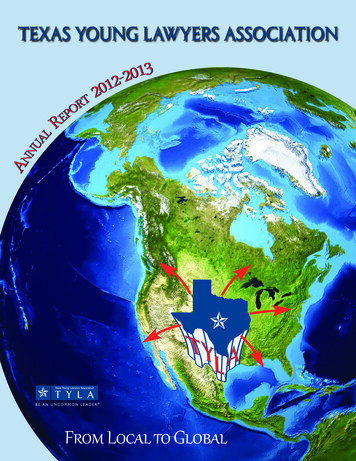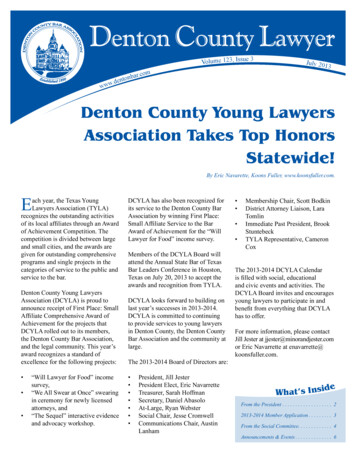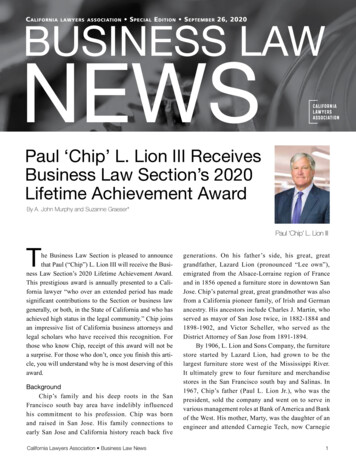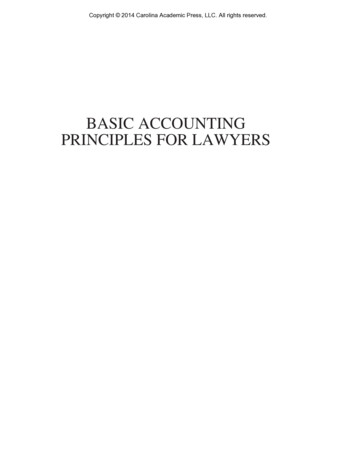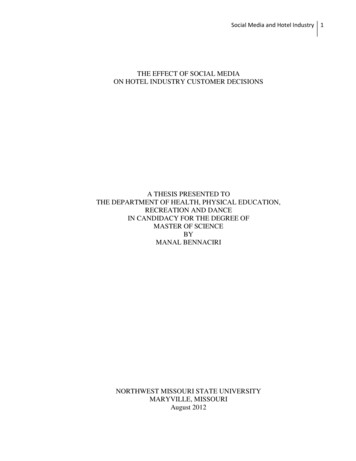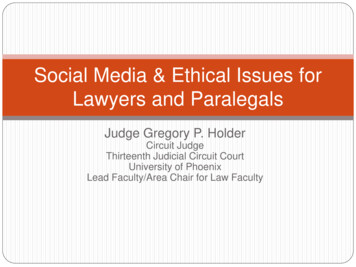
Transcription
Social Media & Ethical Issues forLawyers and ParalegalsJudge Gregory P. HolderCircuit JudgeThirteenth Judicial Circuit CourtUniversity of PhoenixLead Faculty/Area Chair for Law Faculty
Resources to Consider American Bar Association The Florida Bar Hillsborough County Bar Association Judicial Ethics Advisory Committee National Association of Legal Assistants
Rules to Keep in Mind NALA Code of Ethics and ProfessionalResponsibility Canon 1. A paralegal must not perform any of the duties thatattorneys only may perform nor take any actions that attorneysmay not take. Canon 7. A paralegal must protect the confidences of a clientand must not violate any rule or statute now in effect orhereafter enacted controlling the doctrine of privilegedcommunications between a client and an attorney. Canon 9. A paralegal must do all other things incidental,necessary, or expedient for the attainment of the ethics andresponsibilities as defined by statute or rule of court. Canon 10. A paralegal's conduct is guided by barassociations' codes of professional responsibility and rules ofprofessional conduct.
Rules to Keep in Mind Florida Registered Paralegal Program- Code of Ethicsand Responsibility Rule 20-7.1(c) Appearance of Impropriety or Unethical Conduct. A FloridaRegistered Paralegal should understand the attorney's Rules of ProfessionalConduct and this code in order to avoid any action that would involve theattorney in a violation of the rules or give the appearance of professionalimpropriety. It is the obligation of the Florida Registered Paralegal to avoidconduct that would cause the lawyer to be unethical or even appear to beunethical, and loyalty to the lawyer is incumbent upon the Florida RegisteredParalegal. Florida Bar Rules of Professional Conduct Rule 4-1.6 Confidentiality of Information. A lawyer must not revealinformation relating to representation of a client unless an exception applies. Rule 4-2.1 Advisor. In representing a client, a lawyer shall exerciseindependent professional judgment and render candid advice. In renderingadvice, a lawyer may refer not only to law but to other considerations such asmoral, economic, social, and political factors that may be relevant to theclient's situation. Rule 4-3.5 Impartiality and Decorum of the Tribunal. A lawyer shall notseek to influence a judge, juror, prospective juror, or other decision makerexcept as permitted by law or the rules of court.
“Friending” Judges Judges cannot be Facebook friends or LinkedInconnections to lawyers who may appear before them Florida Judicial Ethics Advisory Committee Opinion, 2009-20 (Nov. 17, 2009) Florida Code of Judicial Conduct precludes a judge from addinglawyers who appear before him or her as “friends” on social medianetworking sites. This also precludes lawyers from adding judges astheir “friends.” Why? It conveys the impression that a person has a position ofinfluence on the judge (violates Canon 2B) Three elements are necessary to fall into this prohibition 1. The judge has a social networking page 2. The site allows for accepting or rejecting contacts, or denominatethe judge as a “friend” on another member’s page 3. The identity of the “friends” must be communicated to others
“Friending” Judges Domville v. State, 103 So. 3d 184 (Fla. 4th DCA2012) The Fourth District Court of Appeal held that a trial judgepresiding over a criminal case was required to recusehimself because he was Facebook friends with theprosecutor. Chace v. Loisel, 170 So. 3d 802 (Fla. 5th DCA2014) The Fifth District Court of Appeal determined that a judge’sex parte communication with a party by requesting to“friend” the party was a legally sufficient basis fordisqualification. The court considered the judge’s actions aneffort to initiate ex parte communications with a litigant https://www.youtube.com/watch?v T 9J0wWqyFo
“Friending” Judges Florida JEAC Op. 2012-12 The committee determined that there was not a meaningful distinctionbetween Facebook and LinkedIn, with regard to the process ofselecting “friends” or connections. Found that it would be easier for the judge to make a determination ofwhether the lawyer may appear before the judge. Florida Bar Rule 20-7.1(c): Avoid the appearance of improprietyor unethical conduct –“It is the obligation of the Florida Registered Paralegal to avoid conduct that wouldcause the lawyer to be unethical or even appear to be unethical, and loyalty to thelawyer is incumbent upon the Florida Registered Paralegal.” Similarly, beware of “friending” opposing counsel, representedparties, and be cautious with unrepresented parties Pay attention to privacy settings Consider your own purpose in using the site
Discussing Judges or PendingMatters Be careful! Making comments about judges orpending matters on social media can get you andyour employer in trouble. Rules Regulating the Florida Bar Rule 3-4.2. Rules of Professional Conduct. Violation ofthe Rules of Professional Conduct as adopted by therules governing The Florida Bar is a cause for discipline. Rule 3-4.3. Misconduct and Minor Misconduct. Thecommission by a lawyer of any act that is unlawful orcontrary to honesty and justice, whether the act iscommitted in the course of the attorney's relations as anattorney or otherwise, whether committed within oroutside the state of Florida, and whether or not the act isa felony or misdemeanor, may constitute a cause fordiscipline.
Discussing Judges or PendingMatters Florida Bar Rules of Professional ConductRule 4-8.2(a). A lawyer shall not make a statement that thelawyer knows to be false or with reckless disregard as to itstruth or falsity concerning the qualifications or integrity of ajudge, mediator, arbitrator, adjudicatory officer, public legalofficer, juror or member of the venire, or candidate forelection or appointment to judicial or legal office. Rule 4-8.4. A lawyer shall not:(a) violate or attempt to violate the Rules of ProfessionalConduct, knowingly assist or induce another to do so, or doso through the acts of another; . . .(d) engage in conduct in connection with the practice of lawthat is prejudicial to the administration of justice, including toknowingly, or through callous indifference, disparage,humiliate, or discriminate against litigants, jurors, witnesses,court personnel, or other lawyers on any basis, including,but not limited to, on account of race, ethnicity, gender,religion, national origin, disability, marital status, sexualorientation, age, socioeconomic status, employment, orphysical characteristic;
Discussing Judges or PendingMatters Florida State Bar v. Conway, 996 So. 2d 213 (Fla.2008) Sean William Conway posted a blog discussing JudgeAleman’s policy of requiring criminal defendants to preparefor trial in one week. The blog contained a number ofderogatory remarks, calling the judge an “EVIL, UNFAIRWITCH,” and “seemingly mentally ill.” The Bar Referee determined violations of the followingRules of Professional Conduct:o R. Regulating Fla. Bar 3-4.2; 3-4.3o Florida Bar Rules of Professional Conduct 4-8.2(a), 48.4(a), and 4-8.4(d) The Florida Supreme Court directed Mr. Conway to receivea public reprimand, administered by the Board of Governorsof The Florida Bar. He also was ordered to pay recoverycosts of 1,250.
Social Media as Evidence Florida Evidence Code Section 90.401, Florida Statutes, defines relevant evidenceas evidence tending to prove or disprove a material fact Section 90.402, Florida Statutes, states that all relevantevidence is admissible, except as provided by law Social media can be used against clients in anumber of different types of cases even to catchcriminals.Keep clients apprised of how social mediacan impact their cases
Social Media as Evidence Nucci v. Target Corp., 162 So. 3d 146 (Fla. 4th DCA 2015) Personal injury case where petitioner (Nucci) claimed to have slipped andfallen on a foreign substance on the floor of a Target store. Target movedto compel the inspection of Nucci’s Facebook profile and photographs.Nucci argued she had a reasonable expectation of privacy regarding herFacebook information. The circuit court granted, in part, and denied, in part, the motion tocompel. The order compelled production of certain items posted within alimited period of time. The Fourth DCA found that the photographs would be highly relevant to thedamage issues in the lawsuit. The court considered them relevant to thepost-accident surveillance videos of Nucci that suggested her injuries weresuspect. The Fourth DCA also determined that the relevance of the photographsoverwhelmed Nucci’s privacy interest in them.“We agree with those cases concluding that, generally, the photographs postedon a social networking site are neither privileged nor protected by any right ofprivacy, regardless of any privacy settings that the user may have established.”
Social Media as Evidence O’Leary v. State, 109 So. 3d 874 (Fla. 1st DCA 2013) O’Leary was charged with two counts of sending threats to kill or do bodilyharm (felony of the second degree) in violation of Section 836.10, FloridaStatutes. O’Leary argued that the threats were contained to his personal Facebookpage and not sent as required by the statute. O’Leary filed a motion todismiss the charges. “Sending”- the trial court found that the post was accessible to any memberof the public that wanted to view the page and even if it was only seen bythe recipient, the threat was against the recipient’s family member in thissituation. The trial court denied the motion to dismiss. The First DCA agreed that the statute expressly applies to “electroniccommunication,” and that the post was “sent.” “By posting his threats directed to his family member and her partner onhis Facebook page, it is reasonable to presume that appellant wished tocommunicate that information to all of his Facebook friends.” “Given the mission of Facebook, there is no logical reason to postcomments other than to communicate them to other Facebook users.”
Social Media as Evidence Hall v. Ryan, 98 So. 3d 1195 (Fla. 3d DCA 2012) Hall petitioned for a writ of habeas corpus seeking to reinstate hisrelease on his own recognizance after an affidavit of violation ofprobation was filed based on a new criminal violation. Hall originally pleaded guilty to aggravated battery with adeadly weapon and two counts of child abuse. He wassentenced to 21 months’ prison followed by 3 years’ probation. Prior to pleading guilty, a permanent injunction against Hall wasgranted to his ex-wife, D.C. The new law violation was based on Hall’s contacting D.C.’s 16year old daughter through a Facebook friend request, whichviolated the injunction. The contact via Facebook resulted in contact that the injunctionprohibited. This was sufficient probable cause to believe Hallviolated probation.
Social Media as Evidence The Queen of IRS Tax Fraud“I’M RASHIA, THE QUEEN OF IRS TAX FRAUD I’m a millionaire for the record,so if U think indicting me will B easy it won’t, I promise you! U need more than blackand white to hold me down N that’s to da rat who went N told, as if 1st lady don’thave da TPD under her spell. I run Tampa right now.” Rashia Wilson made a number of posts, including the one above, bragging about tax fraud. She also posted pictures onFacebook of her holding stacks of cash.Ms.Wilson was indicted on 57 counts in 2012. She admitted tonetting over 3 million in the tax refund scam.Ms. Wilson’s defense attorney argued that her posts onFacebook were a result of a mental illness as a means ofmitigation.The judge was not persuaded – she knew it was wrong, andreveled in itShe was sentenced in 2013 to 21 years in prison.
Things to keep in mind Legal ethics & social media rules are constantlychanging, so consider what you are doing onsocial media and how the rules could possiblyapply You are a representation of the lawyer/firm youwork for and your social media footprint stays withyou Consider whether what you are doing is private orpublic Make clients aware of how social media usecould impact them and their case
Questions?
Bibliography Christina Vassiliou Harvey, Mac R. McCoy, Brook Sneath, 10 Tips for Avoiding ethical LapsesWhen Using Social Media, Business Law Today, American Bar Association (Jan. 2014/01/03 harvey.htmlMac McCoy, Legal Ethics 2.0MG!: Ethical Pitfalls for Legal Professionals Using Social Media,The Florida Bar YLD Webinars (Feb. 12, 2015), cle-credit/NALA Code of Ethics and Professional Responsibility, NALA (2007),http://www.nala.org/code.aspxFlorida Bar v. Conway, Digital Media Law Project (Sept. 19, nwayThe Florida Bar v. Conway, SC08–326 (Fla.Oct. 29, 2008), 2008 WL 4748577, available f/daToc!OpenForm&AutoFramed&MFL Sean William C̈onway&ICN 200751308&DAD Public ReprimandWilliam R. Levesque, Feds: Self-proclaimed ‘queen’ of tax fraud indicted, Tampa Bay Times(Dec. 19, 2012), Robert W. Wood, Tax Fraud Queen’s 21 Year Prison Term Struck Down---Despite FacebookTaunts, Forbes (Dec. 13, 2014), spite-facebook-taunts/#5f04ead3764eRobert W. Wood, Queen of Tax Fraud Gets 21 Year Prison Term---For the Second Time,Forbes (Dec. 13, 2014), ine Silvestrini, Tax fraud ‘queen’ sentenced to 21 years, The Tampa Tribune, (July 16,2013), enced-to-21-years-20130716/
A Florida Registered Paralegal should understand the attorney's Rules of Professional Conduct and this code in order to avoid any action that would involve the attorney in a violation of the rules or give the appearance of professional impropriety. It is the obligation of t

